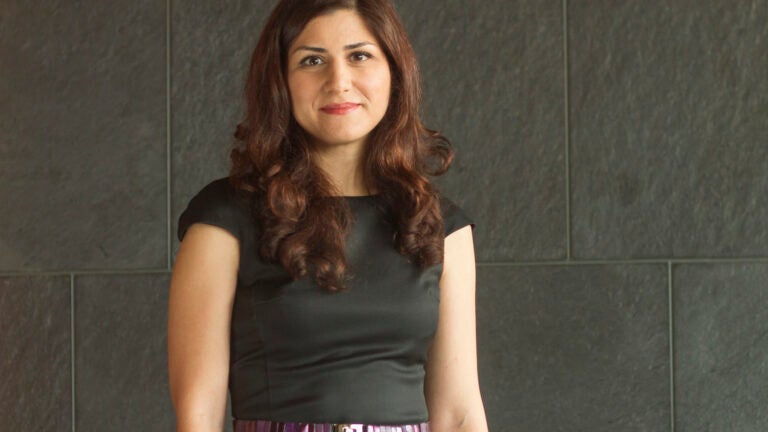
USC Viterbi Assistant Professor Maryam Shanechi (Photo/Will Taylor)
USC Viterbi scholar to lead research on brain-machine interfaces
Eight international universities will take part in the study focusing on neuroscience, machine learning and signal processing
A five-year, $11.25 million Multidisciplinary University Research Initiative grant has been awarded to a USC researcher who will lead a team developing brain-machine interfaces to enhance human decision-making.
The award given by the U.S. Department of Defense and the U.K. Ministry of Defence aims to connect scholars in neuroscience, machine learning and signal processing. The work will focus on developing new methods for modeling neural, behavioral and physiological data from humans in an attempt to understand the brain’s multisensory processing.
USC’s Maryam Shanechi will lead the team including researchers from Cold Spring Harbor Laboratory, Harvard University, New York University, the University of California, Berkeley, Imperial College London, University College London and the University of Essex.
The researchers will study how a person’s decision-making processes work and how humans integrate multisensory input such as visual and auditory cues into a unified percept — for example, how the brain integrates the sight of moving lips with the sound of speech to better recognize it.
The team will generate computational models to create increasingly intelligent interfaces to enhance human performance. The results could be used to enhance a pilot’s decisions or to help a person controlling a vehicle while dealing with distractions.
The steps ahead
The first step to building these intelligent interfaces will be to record human neural activity in real-time, as people interact with a machine and then use that recoding to estimate cognitive mental states — i.e., a person’s alertness or fatigue, his or her focus and how confident that individual might be when a quick decision is required.
The next step will be to create a brain-computer interface incorporating estimated mental states such as situational awareness, confidence in a decision and even the anticipation of a subject’s action. The experiments will be conducted at the aforementioned institutions with the collaboration of Charles Liu, professor of neurological surgery and director of the USC Neurorestoration Center at the Keck School of Medicine of USC.
“The fact that the Department of Defense entrusted the leadership of this [project] to a junior faculty member such as Professor Shanechi is an emphatic endorsement of her remarkable talents in research, scholarship and leadership,” said USC Viterbi School of Engineering Dean Yannis C. Yortsos.
I am very excited about this award because it brings together a diverse team of scholars across engineering, computer science and neuroscience.
Maryam Shanechi
“I am very excited about this award because it brings together a diverse team of scholars across engineering, computer science and neuroscience,” said Shanechi, assistant professor and holder of the Viterbi Early Career Chair in the Ming Hsieh Department of Electrical Engineering.
“So far, brain-machine interface research has mainly focused on restoration of human function and treatment of neurological disorders. In this effort, we will aim to build the next generation of brain-machine interfaces,” she added.
Shanechi is a past recipient of a National Science Foundation Career Award. She has been named one of the world’s Top 35 Innovators Under 35 by MIT Technology Review and one of the Popular Science Brilliant 10.
The Multidisciplinary University Research Initiative award is one of 23 such awards given this year to academic institutions.



